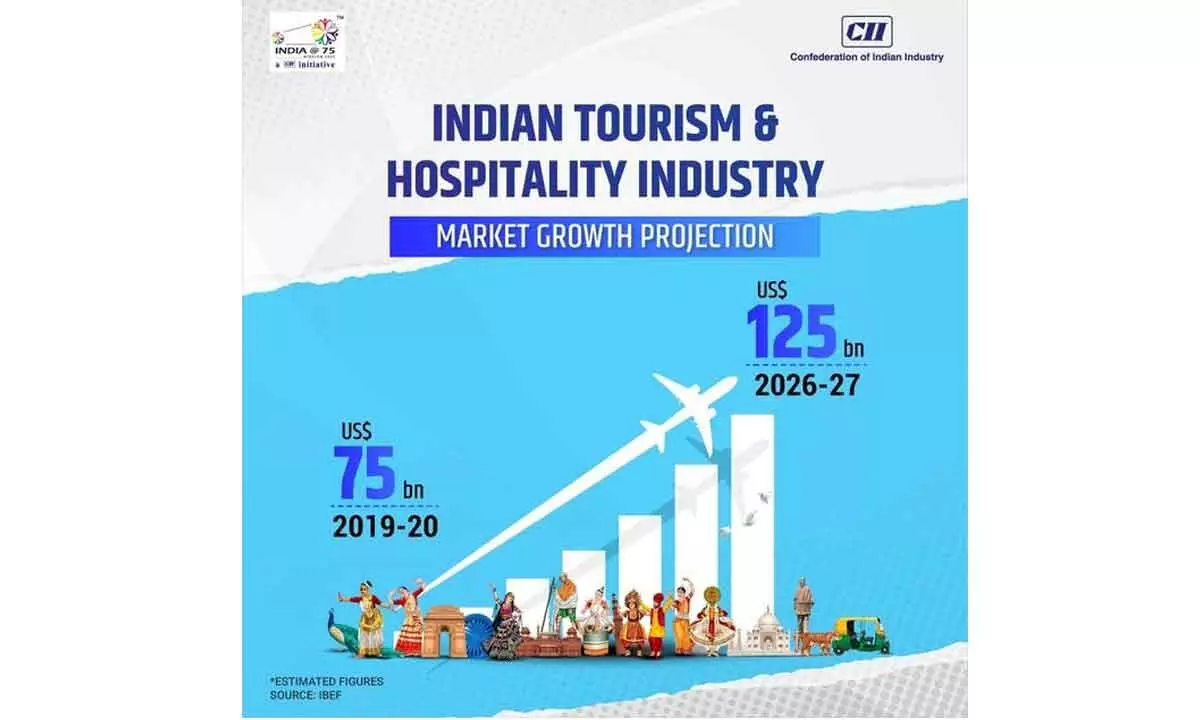India keeping pace with emerging trends in hospitality sector
India is becoming a top destination for luxury and ultra-luxury hotel groups
image for illustrative purpose

Hospitality industry needs people with in-depth knowledge of these specialized areas in order to deliver a brand offering that is expanding beyond pure hotel accommodation
The hotel industry has evolved beyond mere rooms and amenities. It now revolves around crafting unforgettable experiences that cater to the evolving needs and desires of today's traveller. By embracing technological advancements, prioritising sustainability and offering personalised experiences, hotels can secure their place in the ever-evolving travel landscape.
The hospitality sector in India has experienced an impressive jump in hotel investment volumes, according to the latest data from JLL Hotels & Hospitality Group.
In 2023, the sector recorded a total deal volume of $401 million, marking a four-fold increase from 2022.
India is becoming a top destination for luxury and ultra-luxury hotel groups, driven by a surge in domestic travel and the growing affluence of the Indian middle and upper classes.
New ultra-luxury hotel openings are set for next year in cities across the country, including from notable operators like Waldorf Astoria and Raffles.
These luxury hotels get their “ultra” from elements such as exquisite design, personalized services, Michelin-starred restaurants, and high-end spas.
The emergence of India as an ultra-luxury hotel destination can be attributed largely to the domestic market. The country had the second-fastest growing high-net-worth population in the world globally in 2022 (10.5%) and is poised to see a surge of nearly 60% over the next five years, according to JLL data.
Rising disposable incomes are being spent on travel within the country. Prior to the pandemic, foreign travelers accounted for a majority of the country’s ultra-luxury travelers. But this has seen a significant shift, with domestic travelers now accounting for up to 70% of travelers.
Any look ahead to 2024 for the industry must include the topic of sustainability in hospitality and the need to build sustainable practices into day-to-day operations.
Today there is more concern than ever about environmental matters among the global population, and especially in the wealthier, ‘western’ economies which are home to vast numbers of potential guests for the hotel industry.
The industry has already made good progress in this area, particularly in areas such as making better use of resources like power and water, among others. In addition, hotels have always done a great job of providing local employment, but now we are also seeing properties become more integrated in their communities, respecting and showcasing local cultures, and investing in environmental protection schemes.
Hospitality industry needs people with in-depth knowledge of these specialized areas in order to deliver a brand offering that is expanding beyond pure hotel accommodation.
As so often, LVMH Moët Hennessy Louis Vuitton (LVMH) is at the vanguard, thanks to the creation of a dedicated hospitality arm that encompasses luxury hotel brands Belmond and Cheval Blanc. They recognize the crossover between luxury customers and luxury travellers and, from a talent management point of view, they know that the power of their brands – and the lure of the luxury sector as a whole – makes them a magnet for the brightest and best potential recruits.
Within the hotel business itself, continuing rollout of personalization through technology, with innovations like in-room AI-powered chatbots becoming a more common form of guest interaction. Improved, data driven decision making will allow hotels to offer more focused services based on personalization and wellbeing.
In response, the hospitality education sector needs to build crisis and change management into everything we teach. Hospitality is an incredibly resilient industry which has bounced back from all kinds of shocks in recent decades – from September 11 to Covid – but at an individual level we need to ensure that the industry’s future leaders have the agility and resilience to not become overwhelmed during times of crisis.
It’s not all bad news by any means, though. Human nature is such that in challenging times we naturally seek an escape route, and for many of us that means taking a holiday to ‘get away from it all’.
In particular, there is the trend towards staycations being maintained this year, particularly in markets like the United States.
Last but not the least among the challenges, the industry will have to respond to the ESG (Environment, Social & Governance) challenge. Customers – especially on the corporate side – are increasingly shifting their business to hoteliers who fit their own ESG philosophies, while sustainability and ESG reporting must include actions towards climate change at the local, regional and global level.
Indeed, the hotel industry now revolves around crafting unforgettable experiences for the traveller.

